Bisexual men have a higher risk for heart disease compared with heterosexual men across several modifiable risk factors, finds a new study published online in the journal LGBT Health.
"Our findings highlight the impact of sexual orientation, specifically sexual identity, on the cardiovascular health of men and suggest clinicians and public health practitioners should develop tailored screening and prevention to reduce heart disease risk in bisexual men," said Billy Caceres, PhD, RN, AGPCNP-BC, the study's lead author, an adjunct faculty member at NYU Rory Meyers College of Nursing, and a postdoctoral research fellow at Columbia University School of Nursing.
In the United States, more than 30 percent of men have some form of heart disease and it is a leading cause of death. However, little is known about the impact of sexual orientation on heart disease risk in men, despite the fact that gay and bisexual men may be at a higher risk based on modifiable factors like tobacco use and poor mental health.
In this study, the researchers examined differences in modifiable risk factors for heart disease and heart disease diagnoses in men of different sexual orientations. Risk factors measured included mental distress; health behaviors such as tobacco use, binge drinking, diet, and exercise; and biological risk factors such as obesity, hypertension, diabetes, and cholesterol. Participants who reported having angina, coronary heart disease, heart failure, heart attack, or stroke were considered as having a diagnosis of heart disease.
The researchers analyzed responses from 7,731 men ages 20 to 59 who were part of the National Health and Nutrition Examination Survey (2001-2012), a national survey that is used to monitor the health of Americans. Differences were analyzed across four groups based on their sexual identities: gay men, bisexual men, heterosexual men who have sex with men, and heterosexual men.
The researchers found no differences in heart disease diagnoses based on sexual orientation, but risk for heart disease was more complicated. Gay men, heterosexual men, and heterosexual men who have sex with men had similar heart disease risk. Gay men reported lower binge drinking compared with heterosexual men, but otherwise few differences in health behaviors were noted.
Bisexual men, however, had higher rates of several risk factors for heart disease relative to heterosexual men: mental distress, obesity, elevated blood pressure, and three different measures of diabetes (medication use, medical history, and average glycosylated hemoglobin level).
"Poor mental health is a recognized risk factor for the development of heart disease," said Caceres. "Clinicians should be educated about sexual minority health and should routinely screen bisexual men for mental distress as a risk factor for heart disease. This is particularly important as healthcare organizations increasingly include sexual orientation as part of demographic questionnaires in electronic health records."
The researchers also note that the study underscores the importance of disaggregating analyses for gay and bisexual participants to ascertain differences in health outcomes between these subgroups.
###
In addition to Caceres, study authors include Abraham Brody and Caroline Dorsen of NYU Meyers, Deborah Chyun of the University of Connecticut School of Nursing, and Perry Halkitis of Rutgers School of Public Health.
The research was supported by funding to Caceres through a predoctoral institutional training grant (TL1TR001147) from the New York University-Health + Hospitals Corporation Clinical and Translational Science Institute and a postdoctoral fellowship from the National Institute of Nursing Research (T32NR014205) in Comparative and Cost-Effectiveness Research Training for Nurse Scientists.
About the NYU Rory Meyers College of Nursing
NYU Rory Meyers College of Nursing is a global leader in nursing education, research, and practice. It offers a bachelor of science with a major in nursing, a master of science, post-master's certificate programs, a doctor of nursing practice degree, and a doctor of philosophy in research theory and development.
Media Contact
Rachel Harrison
[email protected]
212-998-6797
@nyuniversity
https://www.nyu.edu/about/news-publications/news.h




